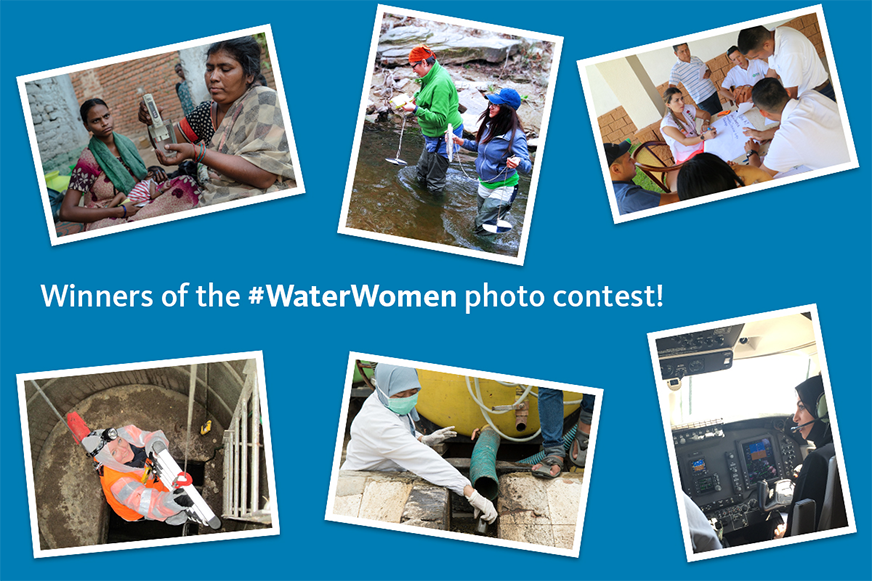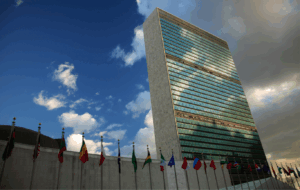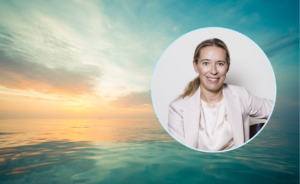“If you can see it, you can be it!” #WaterWomen campaign challenged the way we see women in water
SIWI’s online photo contest gathered more than 150 images of women from all over the globe.
During the months of June and July, SIWI Communications team promoted the #WaterWomen photo contest, a campaign aiming to gather photos that changed the way women are seen in relation to water issues. The mission was to find images that showed women as empowered water managers, stewards and decision makers.
After analyzing more than 150 entries, the jury selected 6 winning photos that will be displayed during World Water Week.
“I was amazed to see the reach of the campaign! I am humbled by how many pictures we received, and by how many took up the challenge to change the way we view women in water,” said Ms. Kanika Thakar, Communications Officer at SIWI and responsible for the #WaterWomen campaign.
Winners are from 6 different countries and five different regions in the world.
View the winning entries below and help us to keep the momentum by sharing the #WaterWomen gallery!
#WaterWomen winners

Caption submitted: Rani (Right), the leader of a women-run “self-help group” named Divya and a community WASH mobiliser conducting water quality test at home for a new mother using field test kit in Amedkar Nagar colony, Medak district, Telangana, India. Full case study : Community WASH Mobiliser: Divya, a women-run “self-help group” Location: Amedkar Nagar colony, Medak district, Telangana, India Ambedkar Nagar, a small settlement in the Medak district of Telangana, India, depends on untreated groundwater. The water here is contaminated with fluoride, nitrates, and salinity. Members of the community can be seen walking with makeshift crutches, as many are suffering from skeletal fluorosis. The teeth of children are often mottled, and incidences of stunting are common. Rani, the leader of a women-run “self-help group” named Divya, understood need for safe water and its health benefits. So when Safe Water Network began promoting the benefits of safe water, she urged her fellow self-help group members to invest in one of Safe Water Network’s iJal Safe Water Stations as a way to reduce waterborne illnesses in Ambedkar Nagar. As a young mother, Rani had seen her two young children frequently fall sick due to consumption of contaminated water. During that period there was no water treatment facility in the village, and boiling or filtering failed to solve the problem. She saw this iJal Station as a unique opportunity and, with missionary zeal, she began educating her community on the relationship between water and health. With this awareness program, she began talking to households, pregnant women, aanganwadis (government-run nurseries) and schools throughout the village. One could see her passionately conducting water quality tests at homes using field test kits and TDS (total dissolved solids) meters, and tirelessly explaining the virtues of safe water, personal hygiene, and sanitation. To drive home her presentations, she compares the cost of monthly water spent at her iJal Station to that spent on doctors’ fees and medicine. “I have seen how safe water changed the health of my family” Rani said. “Sometimes, I share my own experience or I tell how drinking safe water will reduce doctor bills.” Respected in Ambedkar Nagar, Rani leads excellent consumer mobilization programs, and hopes to enroll each and every member of her community.
From the jury: What we love about this photo is the story of self empowerment and the importance placed on community leadership in making meaningful change.
 Caption submitted: Pioneering the faecal sludge treatment in Indonesia: day-to-day business for Ika in Banda Aceh. The city was hit hardest by the tsunami of 2004 and basic services were destroyed. Where large-scale sanitation is mission-critical, she, among others, is responsible for the bacterial analysis and the supervision of a faecal sludge treatment plant. It minimizes odors, is safe for human health and the environment, does not rely on electricity and serves up to 250,000 people. In FSM there’s no getting around the yuck factor – yet to treat faecal sludge sustainably is to engage with it. By improving how we deal with human waste, we can save lives and ensure greater dignity – particularly for women and girls. With no yuck spared, Ika’s work is astonishingly beautiful. We need more women like Ika to make the world a more liveable place – because needless to say, all deserve a chance to thrive. Location: Banda Aceh, Aceh Province, Indonesia. BORDA Monitoring Activities: Bacterial analysis, Faecal Sludge Treatment Plant.
Caption submitted: Pioneering the faecal sludge treatment in Indonesia: day-to-day business for Ika in Banda Aceh. The city was hit hardest by the tsunami of 2004 and basic services were destroyed. Where large-scale sanitation is mission-critical, she, among others, is responsible for the bacterial analysis and the supervision of a faecal sludge treatment plant. It minimizes odors, is safe for human health and the environment, does not rely on electricity and serves up to 250,000 people. In FSM there’s no getting around the yuck factor – yet to treat faecal sludge sustainably is to engage with it. By improving how we deal with human waste, we can save lives and ensure greater dignity – particularly for women and girls. With no yuck spared, Ika’s work is astonishingly beautiful. We need more women like Ika to make the world a more liveable place – because needless to say, all deserve a chance to thrive. Location: Banda Aceh, Aceh Province, Indonesia. BORDA Monitoring Activities: Bacterial analysis, Faecal Sludge Treatment Plant.
From the jury: The image not only challenges the status quo, it reminds us that water challenges don’t end with a tap. Wastewater continues to be a challenge that all water managers will need to address.
 Caption submitted: Yudy is a neighbor of Aguantequerique, in the Department of La Paz, Honduras, where the access to water and drinking quality are serious problems. Water is not available everyday in the area, and many times they have to buy it. Therefore, she has decided to be an active participant at the micro-watershed council, in the Goascorán River Basin, working everyday for find a solution to the problems related to water in her community. She is part of the many “WaterWomen that are making positive changes in their communities.
Caption submitted: Yudy is a neighbor of Aguantequerique, in the Department of La Paz, Honduras, where the access to water and drinking quality are serious problems. Water is not available everyday in the area, and many times they have to buy it. Therefore, she has decided to be an active participant at the micro-watershed council, in the Goascorán River Basin, working everyday for find a solution to the problems related to water in her community. She is part of the many “WaterWomen that are making positive changes in their communities.
From the jury: Not only is Yudy a leader in her community, she is also working to connect all stakeholders. What we also love is that this image reminds us that water can’t just be managed with pipes and pumps, but that stakeholder mapping is a very important part of solving our water
challenges.
 Caption submitted: Jannie Sif Herskind is a bachelor in engineering specialized in environment. She is 34 years old, married and soon-to-be mother of two. The picture is from her first time inside a well (a ‘well-baptism’) – a well to a shared sewage where Jannie had to measure the well internally and asses the condition of the concrete. Jannie works in Skanderborg Utility, Denmark with sewage, sanitation, land development and rain water pools from projections to construction. In Skanderborg Utility we are proud of our inspiring #WaterWomen! We are 1/3 women and half in leadership positions. With our #AquaGlobe partnership we aim for the#GlobalGoals #SDG6From the jury: This image really challenges the way we view women in water. It reminds us that women can push themselves to all sorts of levels to help address water challenges.
Caption submitted: Jannie Sif Herskind is a bachelor in engineering specialized in environment. She is 34 years old, married and soon-to-be mother of two. The picture is from her first time inside a well (a ‘well-baptism’) – a well to a shared sewage where Jannie had to measure the well internally and asses the condition of the concrete. Jannie works in Skanderborg Utility, Denmark with sewage, sanitation, land development and rain water pools from projections to construction. In Skanderborg Utility we are proud of our inspiring #WaterWomen! We are 1/3 women and half in leadership positions. With our #AquaGlobe partnership we aim for the#GlobalGoals #SDG6From the jury: This image really challenges the way we view women in water. It reminds us that women can push themselves to all sorts of levels to help address water challenges.
 Caption submitted: Here, we have Dr. Christine Pappas and Sarita KC who are passionate on water quality management and water conservation. Dr. Pappas leads the Water Resources Policy and Management Master’s degree at ECU. She encourages students to gain real time experiences by monitoring local streams and many more. Sarita KC is a graduate student in the water resources policy and management program at East Central University. Many of her master’s project are based on water quality, management and conservation. She also serves as president to water resources club at ECU. Dr. Pappas and Sarita are volunteers of Blue Thumb and they have adopted little Sandy Creek in Ada to monitor and protect this stream. I am very proud of their actions and attitudes towards water quality management and water conservation.
Caption submitted: Here, we have Dr. Christine Pappas and Sarita KC who are passionate on water quality management and water conservation. Dr. Pappas leads the Water Resources Policy and Management Master’s degree at ECU. She encourages students to gain real time experiences by monitoring local streams and many more. Sarita KC is a graduate student in the water resources policy and management program at East Central University. Many of her master’s project are based on water quality, management and conservation. She also serves as president to water resources club at ECU. Dr. Pappas and Sarita are volunteers of Blue Thumb and they have adopted little Sandy Creek in Ada to monitor and protect this stream. I am very proud of their actions and attitudes towards water quality management and water conservation.
From the jury: We appreciate this photo because not only does it challenge traditional roles, but it underscores the importance of sharing knowledge, something fundamental to our ability to achieve a water wise world.

Caption submitted: UAE Research Program for Rain Enhancement Science Manager Alya Al Mazroui chats with Captain Mark Newman, on board the Beechcraft King Air C-90 Cloud Seeding plane, flying at 6000 ft over the mountains of the Emirate of Ras Al Khaima in the United Arab Emirates. The cloud seeding planes aim to better enhance rainfall in the arid and semi-arid regions all around the globe, and act as a sustainable solution to global water challenges.
From the jury: We love this image because it tells a story that traditional media sometimes fails to. We also love the challenge to ‘traditional’ water management by means of cloud seeding.








